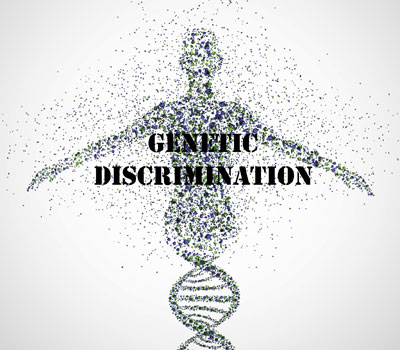Centre for Law and Genetics
Genetic Discrimination
The Genetic Discrimination Project
 UTAS Collaborators: N.A.
UTAS Collaborators: N.A.
Funding Source: ARC Discovery Project
Commencement Date: 2002
Project Status: Completed (2005)
Research Team
- Prof Margaret Otlowski, CI and Project Leader
- Prof Sandra Taylor, CI (School of Social Work and Social Policy, University of Queensland)
- Assoc Prof Kristine Barlow-Stewart (Partner Investigator – Centre of the Genetics Education, NSW)
- Dr Mark Stranger, Research Fellow
- Dr Sue Treloar, Research Fellow (School of Social Work and Social Policy, University of Queensland)
The Project also had an Expert Reference Group comprised of leading experts from a range of disciplines including law, sociology, ethics, clinical and laboratory genetics as well as consumer and industry representatives.
Project Background
Genetic discrimination has become an issue of increasing interest following the expansion of genetic technologies which allow for the identification of individuals' genetic profiles; 'genetic discrimination' refers to the prejudicial treatment of an individual by a third party such as insurers of employers, on the basis of genetic status. This project came about in response to growing concerns about the issue of genetic discrimination in Australia following a number of cases which attracted media attention and calls for legislation to protect individuals from unfair genetic discrimination. The development of this project predated the ALRC/NHMRC Inquiry into the Protection of Human Genetic Information which also identified genetic discrimination as a key issue for the inquiry. Prior to this project, published studies on genetic discrimination in Australia had relied on unverified accounts as there had at that stage been no comprehensive and co-ordinated empirical research about the nature and extent of genetic discrimination in Australia. A key aim of this project was to undertake such a study drawing on a multi-disciplinary team.
About the Project
This project, which was funded through the ARC (as a Discovery Project), involved a nationwide empirical study to explore that nature and extent of genetic discrimination in Australia and its legal and social implications. In particular, the project sought to investigate ways in which an individual's genetic status is being used in certain decision-making processes in Australia with a view to contributing data for use in legal and policy making contexts and establish comprehensive baseline data for further evaluative research. A key feature of the project was its breadth of focus, seeking to gain the experience and perspectives of all key stakeholders across Australia. The project comprised of four distinct sub-projects, involving a triangulated design:
The Consumer Study which documented accounts of alleged genetic discrimination from individual's affected, based on focus group work, a large scale survey of users of genetic testing services and follow up interviews.
The Third Party Study which sought information from insurers, agents and brokers and employers to examine the way in which genetic information has been used to make decisions about employment and insurance. This was done through negotiating to have access to insurance underwriting data involving genetic test results and surveying a representative sample of employers in Australia and conducting interviews with key personnel within those organisations. It also involved the analysis of the relevant policies and guidelines of these organisation and those of their peak bodies. The project was well supported by the then peak life insurance body in Australia (IFSA) as well as other insurance and employer groups.
The Legal System Study sought to gather information about the way in which existing legal and other channels of appeal are being used to deal with claims of genetic discrimination. A survey was undertaken of all tribunals across Australia in which complaints of genetic discrimination might be brought and also follow up of court records of any cases identified.
Finally, the Verification Study which sought to follow up identified instances of genetic discrimination from the Consumer Study with the third party organisation involved with a view to discovering what was involved in their decision-making processes. This represented a unique feature of the project as this kind of verification process had not been undertaken in any other study of this type and thereby provided an opportunity to determine with more accuracy the nature and extent of discrimination and the degree to which it might be justified. Through this component of the project, the project team was able to investigate and verify a number of consumer accounts through examination of corroborating documentation and follow up with the third parties involved.
On the basis of the outcomes of the various sub-projects, recommendations have been developed across a number of areas encompassing improved education and available information for consumers in relation to their legal rights, including information about avenues for legal redress and advocacy support, improvement of insurance practices in relation to underwriting applications involving genetic tests and recommendations for facilitating consumer access to the legal system.
Research Output
Download our Recommendations (PDF 82.8KB) from the key findings of this project.
